
A five step method to help students create effective summaries.
- Subject:
- Composition and Rhetoric
- Reading of Informational Text
- Material Type:
- Homework/Assignment
- Author:
- Holly Towns
- Date Added:
- 12/01/2021

A five step method to help students create effective summaries.

This unit is for teaching a rhetorical visual analysis. It includes the assignment and peer review instructions, assessment rubrics, and a graphic organizer for workshopping the process. It is one way to assess for visual communication skills as required in the Texas Core Objectives.
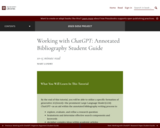
This resource offers student-focused tutorials that demonstrate how ChatGPT can augment the writing process for assignments commonly given in a rhetoric and composition course. These tutorials cover the evaluation essay, rhetorical analysis, Rogerian argument, annotated bibliography, and research essay—all while promoting the responsible and ethical use of AI in writing and research. With this comprehensive resource, instructors and students can not only build confidence in their understanding of generative AI within academia, but also build digital literacy that will serve them in the world beyond.
Author: Mary Landry
By the end of this tutorial, you will be able to utilize a specific formation of generative AI (GenAI)—the prominent Large Language Model (LLM) ChatGPT—as an aid within the annotated bibliography writing process to
explore, evaluate, and refine a research question
brainstorm and determine effective search components and keywords
decipher complex ideas within academic articles
Additionally, you will critically reflect on ChatGPT’s place within the citation practices of an annotated bibliography. Specifically, you will consider why and how ChatGPT should be cited according to both MLA and APA.
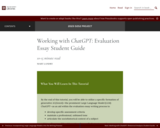
This resource offers student-focused tutorials that demonstrate how ChatGPT can augment the writing process for assignments commonly given in a rhetoric and composition course. These tutorials cover the evaluation essay, rhetorical analysis, Rogerian argument, annotated bibliography, and research essay—all while promoting the responsible and ethical use of AI in writing and research. With this comprehensive resource, instructors and students can not only build confidence in their understanding of generative AI within academia, but also build digital literacy that will serve them in the world beyond.
Author: Mary Landry
By the end of this tutorial, you will be able to utilize a specific formation of generative AI (GenAI)—the prominent Large Language Model (LLM) ChatGPT—as an aid within the evaluation essay writing process to
develop specific assessment criteria
maintain a professional, unbiased tone
articulate the sociohistorical context of a subject
Additionally, you will be able to identify specific limitations with using ChatGPT for an evaluation essay, including its limited ability to perform evaluations itself.
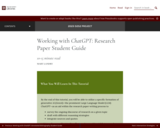
This resource offers student-focused tutorials that demonstrate how ChatGPT can augment the writing process for assignments commonly given in a rhetoric and composition course. These tutorials cover the evaluation essay, rhetorical analysis, Rogerian argument, annotated bibliography, and research essay—all while promoting the responsible and ethical use of AI in writing and research. With this comprehensive resource, instructors and students can not only build confidence in their understanding of generative AI within academia, but also build digital literacy that will serve them in the world beyond.
Author: Mary Landry
By the end of this tutorial, you will be able to utilize a specific formation of generative AI (GenAI)—the prominent Large Language Model (LLM) ChatGPT—as an aid within the research paper writing process to
survey the ongoing discourse of research on a given topic
draft with different reasoning strategies
integrate sources and quotes
Additionally, you will critically reflect on the possible pitfalls in regards to originality and time management when using ChatGPT as an aid for composing a research paper.
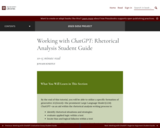
This resource offers student-focused tutorials that demonstrate how ChatGPT can augment the writing process for assignments commonly given in a rhetoric and composition course. These tutorials cover the evaluation essay, rhetorical analysis, Rogerian argument, annotated bibliography, and research essay—all while promoting the responsible and ethical use of AI in writing and research. With this comprehensive resource, instructors and students can not only build confidence in their understanding of generative AI within academia, but also build digital literacy that will serve them in the world beyond.
Author: Jonahs Kneitly
By the end of this tutorial, you will be able to utilize a specific formation of generative AI (GenAI)—the prominent Large Language Model (LLM) ChatGPT—as an aid within the rhetorical analysis writing process to
identify rhetorical situations and strategies
evaluate applied logic within a text
locate bias and logical fallacies within a text
Additionally, you will be able to develop critical evaluation skills to avoid the possible pitfalls from using GenAI for performing rhetorical analysis.
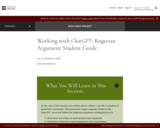
This resource offers student-focused tutorials that demonstrate how ChatGPT can augment the writing process for assignments commonly given in a rhetoric and composition course. These tutorials cover the evaluation essay, rhetorical analysis, Rogerian argument, annotated bibliography, and research essay—all while promoting the responsible and ethical use of AI in writing and research. With this comprehensive resource, instructors and students can not only build confidence in their understanding of generative AI within academia, but also build digital literacy that will serve them in the world beyond.
Author: Jonahs Kneitly
By the end of this tutorial, you will be able to utilize a specific formation of generative AI (GenAI)—the prominent Large Language Model (LLM) ChatGPT—as an aid within the Rogerian argument writing process to
determine and refine an appropriate topic argument
brainstorm effective counterarguments and concessions
locate faulty logic and explore workable solutions
Additionally, you will develop critical evaluation skills to avoid the possible pitfalls with using GenAI for argumentation.
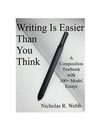
This composition textbook is designed to serve undergraduate-level writing courses.
This book was designed for Composition I (ENGL 1301) and Composition II (ENGL 1302) courses—specifically, to meet the Academic Course Guide Manual (ACGM) expectations for these courses as defined by the Texas Higher Education Coordinating Board.
The most-distinctive feature of this book is 100+ models essays written by students. Model essays appear as links at the ends of chapters.
The Table of Contents contains hyperlinks that open individual chapters.
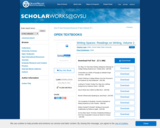
Volumes in Writing Spaces: Readings on Writing offer multiple perspectives on a wide-range of topics about writing. In each chapter, authors present their unique views, insights, and strategies for writing by addressing the undergraduate reader directly. Drawing on their own experiences, these teachers-as-writers invite students to join in the larger conversation about the craft of writing. Consequently, each essay functions as a standalone text that can easily complement other selected readings in writing or writing-intensive courses across the disciplines at any level.
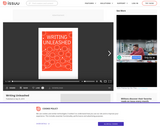
Third revision, August 2017.
Welcome to Writing Unleashed, designed for use as a textbook in first-year college composition programs, written as an extremely brief guide for students, jam-packed with teachers’ voices, students’ voices, and engineered for fun.
This textbook was created by Dana Anderson, Ronda Marman, and Sybil Priebe - all first-year college composition instructors at the North Dakota State College of Science in Wahpeton, ND.
Download here: https://drive.google.com/open?id=1JoX94RjwS-WoPnGCyIZ9ZTQeX74iG9hS

In the age of Buzzfeeds, hashtags, and Tweets, students are increasingly favoring conversational writing and regarding academic writing as less pertinent in their personal lives, education, and future careers. Writing and Literature: Composition as Inquiry, Learning, Thinking and Communication connects students with works and exercises and promotes student learning that is kairotic and constructive. Dr. Tanya Long Bennett, professor of English at the University of North Georgia, poses questions that encourage active rather than passive learning. Furthering ideas presented in Contribute a Verse: A Guide to First-Year Composition as a complimentary companion, Writing and Literature builds a new conversation covering various genres of literature and writing. Students learn the various writing styles appropriate for analyzing, addressing, and critiquing these genres including poetry, novels, dramas, and research writing. The text and its pairing of helpful visual aids throughout emphasizes the importance of critical reading and analysis in producing a successful composition. Writing and Literature is a refreshing textbook that links learning, literature, and life.
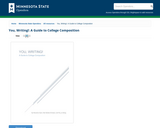
This text is meant to be used in any first year College Composition class or as a general guide to college writing. The book focuses on writing as a process, not a product. The goal is to help students discover their own writing process, trying out different methods and strategies to find what works best for them.
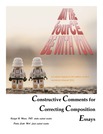
The fourCE is an ehandbook that is designed to help college freshmen understand the expectations of current MLA (Modern Language Association) style standards and composition expectations. The ehandbook utilizes fluid content (videos), as well as static content (text, power points, and worksheets) to engage, educate, and reinforce basic composition skills.
The fourCE ehandbook is a pdf document. In order for the links within the document and outside the document to supplemental to correctly hyperlink, the document must be downloaded and saved.